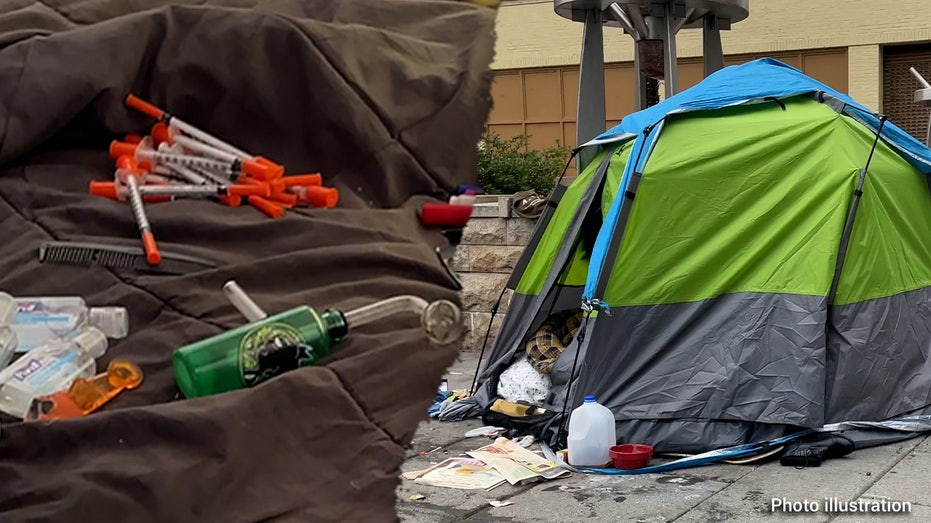Texas 2023: Year in Photos

Texas photojournalists fanned the state, capturing historic news and intimate moments.
‘Enormous mistake’: Business leaders, residents fed up with blue state drug laws issue 2024 ultimatum

A group of political and business leaders are urging Oregon’s legislators to reform the state’s permissive drug laws in the beginning of 2024. If lawmakers don’t act, that coalition will bring a ballot measure to the very voters who decriminalized drugs three years ago. “Oregonians still believe that the best strategy is a minimal use of criminal justice resources to encourage people into treatment and recovery,” former state legislator and onetime director of the Oregon Department of Corrections Max Williams said. “But they also realize the tools that we’ve currently given law enforcement … are not working.” PORTLAND WOMAN KNOCKED OUT BY ATTACKER BLAMES CITY FOR SLOW POLICE RESPONSE: ‘WE DID THIS TO OURSELVES’ Nearly 60% of Oregon voters passed Measure 110 in 2020, decriminalizing personal use amounts of all drugs and redirecting swaths of the state’s marijuana tax revenue to fund grants for addiction services. The rollout was beleaguered by bureaucratic flubs and a brief implementation timeline. It also coincided with the nationwide fentanyl crisis. More than 100,000 people across the country died from a drug overdose in 2022, a 45% increase since 2019, according to Centers for Disease Control and Prevention data. Now, polls consistently show Oregonians souring against the unprecedented (and so far unrepeated) law. The Coalition to Fix and Improve Ballot Measure 110 has commissioned three this year, the most recent of which found 74% of respondents favored recriminalizing possession of fentanyl, heroin and meth and making treatment required, not voluntary, as an alternative to jail. A full 86% of respondents also said Oregon should immediately ban the use of hard drugs in public. “Oregon has turned into an international spectacle, and I think we looked at each other and realized that we made an enormous mistake,” Portland trial attorney Kristin Olson, who voted in favor of the ballot measure and describes herself as a lifelong liberal, previously told Fox News. So the coalition, backed by big names like Nike co-founder Phil Knight and Columbia Sportswear CEO Tim Boyle, has put forth a voter initiative they believe would put the state back on the right track. Their proposal doesn’t completely repeal the law. It still prioritizes diversion, treatment and recovery over prosecution and jail, but recriminalizes possession of small amounts of hard drugs and completely bans public drug use. It also aims to improve oversight of how tax dollars are spent and beef up penalties for drug dealing. WATCH MORE FOX NEWS DIGITAL ORIGINALS HERE When Measure 110 took effect, it made possession of small amounts of drugs punishable by just a $100 fine, which suspects could have waived if they completed a substance use assessment. But less than 1% of people ticketed have completed a treatment evaluation, according to Oregon Judicial Department data. “Writing somebody a ticket that is oftentimes less than what you would get for parking illegally in downtown Portland is not motivating people to seek treatment and recovery,” Williams told Fox News. “The data for that is overwhelming.” But supporters of Measure 110 say the 1% figure doesn’t capture the more than 7,000 people who received substance use treatment in the first quarter of 2023. A further 11,000 clients utilized peer support services and 14,000 accessed harm reduction supplies like clean needles, smoking kits and naloxone, according to state data. Oregon has so far approved $264 million in grants for more than 200 service providers, according to the most recent audit from the Secretary of State’s office. Measure 110 supporters worry a return to criminalization will be “harmful and ineffective.” “It re-stigmatizes people who need help. People are less likely to get help when they are stigmatized,” Tera Hurst, executive director of the Oregon Health Justice Recovery Alliance, a coalition of state and national groups that supported the law, told The Oregonian. STATE OF SQUATTING: AMERICA IS AT A ‘TURNING POINT,’ SAYS HANDYMAN WHO HELPS PEOPLE RECLAIM THEIR HOMES And although overdose deaths in the state increased nearly 75% from 2020 to 2022, researchers at New York University’s Grossman School of Medicine wrote in a September paper that they found no evidence of an association between decriminalization and fatal overdose rates in Oregon. The same was said for Washington, where drugs were decriminalized for just over two months after the state Supreme Court threw out the previous drug possession law. Williams conceded that decriminalization did not create Oregon’s current overdose, crime and livability issues, but argues that it “exacerbated every one of these situations.” He said it’s telling that, three years later, Oregon is still the only state to have decriminalized drugs. “Nobody’s looked at Oregon and said, ‘Wow, this is a model of fabulous success,’” he said. “If anything, a state like our friends to the north in Washington, I think, quickly moved to reinstate criminal sanctions associated with possession of these hard drugs because they did not want to follow the pattern that Oregon had followed.” The Oregon legislature heard testimony on Measure 110 earlier this month ahead of its upcoming short session in February. Portland Mayor Ted Wheeler urged lawmakers to criminalize public drug use, and downtown business owners blamed the law for turning the city into a “virtual drug supermarket.” If the legislature doesn’t take action, Williams said the coalition is prepared to run its proposal as a ballot measure. But they’d prefer not to wait for November. “There really are people that are dying as a result of this policy,” he said. Waiting “just delays the crisis that we’re in that much longer.”
Ram Mandir event: List of rituals, events in Ayodhya from January 16-22

On January 22, Shri Ram will be seated in his divinely grand temple in the presence of Prime Minister Narendra Modi.
Iowa GOP chair predicts ‘potential for a record turnout’ in 2024 caucuses as new voters ‘surge’

The longtime chair of the Iowa GOP says there’s a chance for a “record turnout” when his state’s caucuses on January 15 lead off the Republican presidential nominating calendar. The Republican record was set eight years ago, when roughly 186,000 voters cast ballots in a wide-open GOP caucus that was narrowly won by Sen. Ted Cruz of Texas. “I think there is a potential for a record turnout. Certainly we’re going to be well above 100,000,” Iowa Republican Party chair Jeff Kaufmann emphasized in a recent Fox News Digital interview. Kaufmann pointed to what he characterized as a surge in new voters showing up at Republican presidential campaign events across the Hawkeye State. RAISING THE STAKES: ARE TRUMP’S EXPECTATIONS TOO HIGH IN IOWA’S JAN. 15 REPUBLICAN PRESIDENTIAL CAUCUSES? “You come to these events, regardless of the candidate, and you ask how many people are going to caucus for the very first time. I’m seeing a fourth, a third of the people raising their hand,” Kaufmann said. “That’s the unknown factor that makes it harder to predict, but it makes it wonderful as a party chair to know that we’re going to have even more registered Republicans.” The caucus, unlike most primary elections, is run by the state party. And Kaufmann, with the clock ticking toward caucus day, shared his concerns. WHAT THE LATEST FOX NEWS POLLING IN IOWA SHOWS “We’ve got 1,657 precincts. Almost 10,000 volunteers. Anything can go wrong, but the key is making sure you have stopgaps, you have double checks, you have everything that you need in order to make sure that a process that big, that reliant on volunteer help, everything goes well. So I don’t sleep for the next four weeks,” he said as he spoke with Fox News six days before Christmas at a rally headlined by former President Donald Trump. But he added: “we feel good with where we’re at. We’re doing caucus trainings by the hundreds.” Trump remains the commanding front-runner in the Iowa GOP presidential caucus, with his support at 50% or more in the latest surveys. A FOX Business poll indicated Trump at 52%, far ahead of two closes rivals — Florida Gov. Ron DeSantis at 18% and former ambassador to the United Nations and former South Carolina Gov. Nikki Haley at 16%. The Trump campaign’s ground game operation in Iowa is leagues ahead of his 2016 effort, when he narrowly lost the caucuses to Cruz. “Ted Cruz won in 2016 because his ground game was fantastic,” Kaufmann, who remains neutral in the Republican nomination race, told Fox News. AS FRONT-RUNNER TRUMP RETURNS TO IOWA, RIVALS HALEY AND DESANTIS TURN UP THE VOLUME — ON EACH OTHER And pointing to the 2024 Trump campaign, Kaufmann emphasized that “their ground game has increased immensely.” After losing to Cruz eight years ago, Trump, in an unproven claim, charged that “Cruz didn’t win Iowa. He stole it.” It was a taste of things to come, as Trump has repeatedly charged without providing concrete evidence that his 2020 general election loss to President Biden was “rigged” with “massive voter fraud.” But Kaufmann said he’s not concerned about Trump claiming that the 2024 caucuses will be “rigged” if the former president doesn’t live up to expectations. “We have such a transparent process. We count the ballots in the actual room. We report the ballots in the actual room,” he emphasized. And Kaufmann added that “the conversations I’ve had with the Trump campaign have not revolved at all around any kind of rigged elections or anything of that nature. . . . We’ve got some great ground games right now in this state. And Donald Trump has one of those great ground games. And so that’s what wins an Iowa caucus.” Get the latest updates from the 2024 campaign trail, exclusive interviews and more at our Fox News Digital election hub.
What is ‘swatting,’ the ‘criminal harassment’ hoax that’s hit 3 GOP lawmakers since Christmas?

Three Republican lawmakers have been the target of “swatting” at their homes since Christmas Day, with a legal expert calling the act “criminal harassment.” “Swatting” is a crime that has become prominent in recent years, gaining more steam in the social media age when people’s addresses are easily accessible. George Washington University law professor Jonathan Turley told Fox News Digital that swatting is a crime that could be “charged as a form of criminal threats.” MTG TO INTRODUCE BILL TARGETING ‘SWATTERS’ AS RICK SCOTT BECOMES LATEST TARGET “Swatting constitutes a false police report that can be criminally charged,” Turley said. “Virginia recently passed a new law making swatting specifically a criminal misdemeanor. It can also be charged as a form of criminal threats.” “This is a crime that flourishes because there is insufficient deterrent,” Turley continued. “The anonymity and rare prosecutions combine to fuel this form of criminal harassment.” “There is no mystery to how to address these crimes. There must be greater detection and penalties to achieve deterrence,” he added. The crime targets an individual by calling in a false police report for a violent crime — such as a murder, a hostage situation or other crimes that would require a greater law enforcement response — to the home of the target. The goal of the false police report is to elicit a SWAT team response by the police to the target’s home. Consequently, swatting draws police resources away from real crimes while the state becomes the unwitting arm to terrorize a person at their own home. Now, national leaders are being targeted by swatters who have sent the police to their homes. Since Christmas, three Republican lawmakers — Sen. Rick Scott of Florida and Reps. Brandon Williams of New York and Marjorie Taylor Greene of Georgia — have been victims of swatting at their homes. Scott became the latest victim, announcing on Thursday that his home was swatted the night before while he and his wife were out to dinner. “Last night, while at dinner with my wife, cowards ‘swatted’ my home in Naples. These criminals wasted the time & resources of our law enforcement in a sick attempt to terrorize my family,” Scott wrote on X. Both Williams and Greene announced on social media that their homes had been hit on Christmas Day. Williams told Fox News’ Kayleigh McEnany that there was “no question” the swatting incident against him was an intimidation tactic over his pro-Israel stance. Greene announced Wednesday that she would introduce a bill to target swatters after her family member’s house was also hit this week. Fox News Digital’s Ellizabeth Elkind contributed reporting.
Hochul vetoes Democrat-backed bill changing state campaign financing program

New York Democrat Gov. Kathy Hochul vetoed an election bill on Wednesday that would have significantly changed the state’s newly established system to publicly finance political campaigns by raising the dollar threshold for candidates to qualify in state elections. As it stands, New York’s Public Campaign Finance Program allows statewide or state legislative office candidates to receive public matching funds at rates of up to 12-to-1 based on small donations — anywhere between $5-$250 — from residents in their district. More than 160 candidates have already opted in for the 2024 election cycle. But under the now-rejected measure, which state lawmakers narrowly passed in June, political contributions of any size could have been matched with $250 in public funding, increasing the thresholds for a candidate to participate in the program. “New York’s distinctive public campaign finance laws were written to amplify the voices of low-dollar donors in State elections and diversify the pool of candidates who can run for office,” Hochul said in a veto memo, adding that increasing the number of donations eligible for public matching funds would also add “significant costs” to the state budget that are not accounted for in its financial plan. “Signing this bill would effectively reduce the impact of small donors on elections, in direct contravention of the purpose for which the [Public Campaign Finance Program] was originally adopted,” she said. Sponsored by Brooklyn Democrat lawmakers, Assembly Member Latrice Walker and state Sen. Zellnor Myrie, the bill passed in June in both Democrat-controlled legislative chambers: 80 to 66 in the Assembly and 34 to 29 in the Senate. Hochul’s rejection came as a surprise as she sided with every state Republican lawmaker, including a handful of Democrats, who voted against the measure. New York Republican election attorney Joseph Burns told Fox News Digital that conservative lawmakers have long held the position of opposing public finance programs, asserting they fail to improve democracy and the state’s electoral system. “And they end up just becoming an unnecessary and wasteful taxpayer subsidy of politicians and political campaigns,” Burns said. Burns suggested that the origins behind the bill signaled more of a fight between the progressive and establishment Democrats. “The genesis of this bill to make it more difficult to qualify was that many establishment Democrats realized that progressive candidates and generally underfunded progressive candidates were poised to take advantage of it,” Burns said. “Which, of course, would have threatened the number of establishment Democrats in primaries.” Hochul’s veto received applause from good-government groups and public campaign finance advocates, who argued the bill would have undermined the voice of everyday New Yorkers and countered the influence of wealth in politics. “Because the program’s match is limited to small contributions from constituents, it will push back on the toxic influence of big money in our politics and uplift the voices of everyday voters,” Joanna Zdanys, senior counsel in the Elections and Government Program at the Brennan Center for Justice, said in a statement. “It will give candidates a powerful incentive to engage with their own constituents. And it will open pathways for New Yorkers who aren’t wealthy to participate [in] the political process.” Fox News Digital reached out to the governor’s office but did not immediately receive a response.
‘The revolution will continue’: Syrian protesters vow ahead of 2024

Sweida, Syria – On Friday, people carried red flowers, flags and banners as they headed towards Freedom Square in the city centre to take part in a demonstration filled with songs and chants calling for the overthrow of the Syrian regime. “The revolution will continue and we will keep taking to the streets to achieve our demands,” Lubna al-Basit, 30, declared resolutely to Al Jazeera. It was the 130th such demonstration since they began taking place on a daily basis in August. This time, there was a particularly festive feel in anticipation of the New Year in the air. Worsening living conditions and lack of public services have sparked protests in regime-held areas over the past few years of the civil war, but they have not been this sustained and populous before. This time, the slogans shouted are more reminiscent of 2011 when protests were met with brutal repression by the security forces. The year 2023, which was kicked off with the earthquake disaster in Turkey and Syria, has borne witness to several important international and local developments for Syria. The Maland Mosque dome in Idlib fell to the ground when the February 6 earthquake destroyed the structure beneath it [Ali Haj Suleiman/Al Jazeera] Since the start of this year, the Syrian pound has halved in value against the dollar. Before the war it traded at 47 Syrian pounds to the dollar; at the start of 2023, it was around 6,500 Syrian dollars. Now, having been devalued halfway through the year by the Central Bank, it is trading at just over 13,000 to the dollar. Public services and living conditions have gone “from bad to worse”, al-Basit said. She placed the blame firmly on the “bankruptcy” of the Syrian regime and its inability to provide anything better for its people. “These demonstrations will continue in 2024 because there is no seriousness in resolving the Syrian issue.” Normalisation and precautions A few months before the protests in Sweida began last summer, the Arab League took the decision to bring Syria back into the fold. However, this normalisation of relations with the Syrian regime did not put a stop to the illegal trading of the highly addictive drug, Captagon, which is exported from Syria to the Gulf countries and around the world, as clashes continue on the southern border between the Jordanian army and Syrian drug smugglers. People collect belongings after their house was bombed by Russian warplanes in the village of Jaftlik Haj Hammoud, north of Jisr al-Shughur [Ali Haj Suleiman/Al Jazeera] Al-Basit and other activists participating in the protests in Sweida last Friday said they were not surprised. “The Syrian crisis is fundamental to the Arab world and must be resolved because the danger of [President] Bashar is crossing the borders,” al-Basit said. Even with the normalisation of relations between Syria and other Arab nations, activists remain hopeful that the regime can still be held to account, for example via the international court of justice proceedings against Syria for violations of the Convention against Torture. Furthermore, the arrest warrant issued by France this year against President Bashar al-Assad for his role in the chemical massacre of 2013 has brought hope to some people. Radwan al-Atrash, the director of the Syrian Centre for Community Development, told Al Jazeera that peaceful demonstrators across Syria support all accountability efforts. “[These are] all positive factors in finding a solution to the Syrian crisis.” Despite continued bombing of northwestern areas in Syria, scouts gather in downtown Idlib to show support for Gaza [Ali Haj Suleiman/Al Jazeera] Although the bombing and targeting of civilian areas and gatherings has not stopped in northwestern Syria, action by Syrian organisations to support Gaza has continued. “Standing with peoples exposed to injustice” is what has motivated the continued protests despite the danger, al-Atrash said. Millions in danger “The international community must realise that the lives of millions of Syrians are in danger,” Mounir Mustafa, deputy director of the Syrian Civil Defense (White Helmets), told Al Jazeera. In August, the White Helmets held an event in Idlib to commemorate the 10th anniversary of a chemical weapons massacre of 1,000 people in villages in Ghouta, southern Syria, by the regime. Members of the Syria Civil Defence (White Helmets) commemorate more than 1,000 victims of a 2013 chemical weapons massacre by the regime in southern Syria [Al Haj Suleiman/Al Jazeera] This year, the regime’s focus has been on the northwestern part of the country, where 1,232 attacks by the Syrian regime and its allies have been recorded this year. These have caused the deaths of 162 people and the wounding of 684 others, half of whom were women and children. Mustafa said he believes the regime is stepping up its attacks in direct response to the protests in Sweida. “It is using escalation as a means to tighten its grip on power and impose its presence as a capable actor,” he said, adding that the bombing had targeted vital facilities with internationally banned weapons. Mustafa described the consequences of continued bombing as “catastrophic” in light of the growing humanitarian disaster in the area, and the lack of funding for relief operations. Russian warplanes target the west of Idlib city [Ali Haj Suleiman/Al Jazeera] Heated fronts all over the map In his briefing to the Security Council On Thursday last week, UN Special Envoy to Syria Geir O Pedersen spoke about the fighting and attacks that other areas of Syria have also suffered in 2023. Most significant, he said, has been the intense Israeli bombing of Damascus and Aleppo airports since the start of the war on Gaza, which has impeded the movement of civilians and humanitarian operations by the United Nations. He said the battles in Deir ez-Zor between the Arab tribes and Syrian Democratic Forces (SDF) at the end of August, as well as the continued SDF clashes with Turkey, represent an escalation of the deadly violence in Syria. “No one should delude themselves that this worrying new normal of ongoing
Photos: 2023 – a year in pictures

From the Israel-Hamas war to Russia’s grinding battles against Ukraine, 2023 has shown the dangers of armed conflicts breaking out into region-wide combat. It has revealed the human struggle – to protect loved ones, to navigate a warming planet, to escape strife and oppression, to survive nature’s capriciousness. Go through our gallery below to see some of the most powerful photographs defining the last 12 months. Adblock test (Why?)
Russian poets given long jail terms for reciting verses against Ukraine war

Artyom Kamardin, 33, and Yegor Shtovba, 23, sentenced for ‘undermining national security’, ‘inciting hatred’. A court in Moscow has sentenced two Russian men to several years in prison for reciting poetry against the war in Ukraine during an anti-mobilisation protest last year as the Kremlin presses on with its crackdown on dissent. Artyom Kamardin, 33, was sentenced to seven years in jail on Thursday after being convicted of making calls “undermining national security” and “inciting hatred”. The charges were linked to him reading his anti-war poems at the rally in Moscow in September 2022. The Tverskoy District Court also sentenced Yegor Shtovba, 23, to a five and a half year term on the same charges, after he participated in the event and recited Kamardin’s verses. The demonstration last year was held days after President Vladimir Putin ordered the mobilisation of 300,000 reservists amid Russia’s military setbacks in Ukraine. The widely unpopular move prompted hundreds of thousands to flee the country to avoid being recruited into the military. Kamardin read out his poem, “Kill me, militia man!”, ending with the line, “Glory to Kievan Rus, Novorossiya – suck!” – using the historic terms for Ukraine’s capital Kyiv and a term from days of the Russian Empire that Moscow uses for the area of southeastern Ukraine it is trying to annex, respectively. Russian poet Artyom Kamardin stands inside the defendants’ glass cage as his sentence is read out in court, on December 28, 2023. He recited his poem, ‘Kill me, militia man!’ at an anti-war rally last year [Alexander Nemenov/ AFP] Days later, police stormed into the apartment Kamardin shared with his then-girlfriend, Alexandra Popova, and another activist. According to Amnesty International, Popova said police beat and violated Kamardin with a dumbbell before forcing Popova to watch a video of the act. She also claimed that police super-glued stickers to her face and threatened to rape her. A clip later circulated on Telegram of the bruised and battered Kamardin apologising for his words. Authorities in Russia have detained thousands of people under wartime censorship laws for their simple acts of protest against the offensive in Ukraine. Just before his sentencing, a smiling Kamardin recited a poem that refers to poetry as “gut-wrenching” and often disliked by “people accustomed to order”. Popova, now his wife, was escorted out of the courtroom by bailiffs after she shouted “Shame!” following the verdict. “It is a very harsh sentence. Seven years for poems, for a non-violent crime,” she told the AFP news agency, before being taken away by police officers. According to OVD-Info, a prominent rights group that monitors political arrests and provides legal aid, 19,834 Russians have been arrested between February 24, 2022, when Russia began its invasion, and late October 2023, for speaking out or demonstrating against the war. Adblock test (Why?)
Watch: Rahul Gandhi shows Jiu-Jitsu skills in viral video, engages in martial art bout with Bajrang Punia

The former Congress president also learnt some of the wrestling moves such as ‘dhobi pachaad’ and ‘dhak’ with Bajrang explaining him the difference between wrestling on the mud and on mat.

